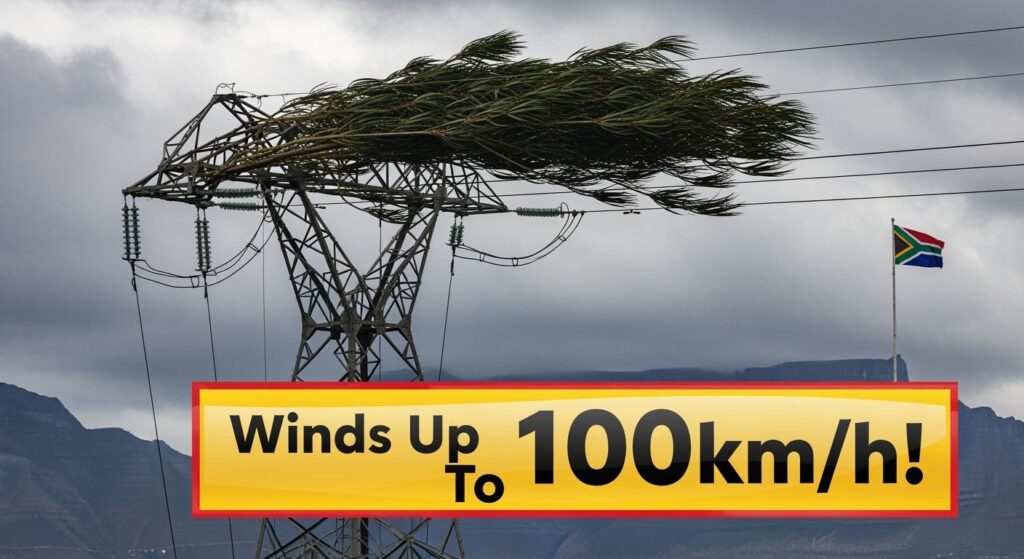Strong winds South Africa: I want to alert all our readers about a critical weather situation developing across South Africa today. The national weather service has issued an urgent warning regarding potentially damaging strong winds expected to sweep across multiple provinces. These high-velocity winds pose significant risks to infrastructure, transportation, and personal safety. If you’re planning to be outdoors or commuting today, this information is essential for your safety and preparedness. Have you checked your local weather forecast yet? The intensity of these winds shouldn’t be underestimated, and taking precautionary measures could prevent unfortunate incidents.

What Areas Will Be Most Affected?
The strong winds in South Africa are expected to impact several regions with varying intensity. Coastal areas along the Western and Eastern Cape are predicted to experience the most severe conditions, with wind speeds potentially reaching up to 80-100 km/h. Urban centers including Cape Town, Port Elizabeth, and parts of Durban may face disruptions to normal activities. Inland regions aren’t exempt either, with the Free State and parts of Gauteng also under advisory for strong gusting winds. The weather system is moving rapidly, meaning conditions could deteriorate quickly in affected areas. Mountainous regions present additional hazards as wind speeds tend to amplify in these topographies, creating dangerous situations for travelers and residents alike.
Why These Winds Are Particularly Dangerous
These strong winds in South Africa represent more than just a minor inconvenience – they constitute a genuine safety hazard. The primary concern is flying debris, which can cause injuries and property damage without warning. Loose objects like roof sheets, tree branches, and unsecured items can become dangerous projectiles. Additionally, high-profile vehicles such as trucks and buses face increased risk of overturning on exposed highways and bridges. Power infrastructure is particularly vulnerable, with potential for widespread outages as lines may be damaged by falling trees or direct wind pressure. The dry conditions in many regions also elevate the risk of rapid fire spread should any ignition occur. For those living in informal settlements, the danger is even more acute as structures may not withstand the sustained pressure of powerful gusts.
How to Stay Safe During Strong Winds
- Secure or store away outdoor furniture, toys, and garden equipment
- Park vehicles away from trees and power lines if possible
- Postpone unnecessary travel, especially on exposed routes
- Keep emergency supplies including flashlights and charged phones ready
Preparing for strong winds requires both foresight and practical action. I recommend checking your property for any loose items that could become airborne – this includes garden furniture, trampolines, and even garbage bins. Inside your home, stay away from windows during the peak of the storm as broken glass presents a serious hazard. If you absolutely must travel, allow extra time for your journey and maintain a firm grip on your steering wheel, especially when passing high-sided vehicles or moving through exposed areas. Keep emergency contact numbers readily available, including your local disaster management center. Remember that cell towers may be affected, so having alternative communication plans is wise.
When to Expect Conditions to Improve
According to meteorological projections, the strong winds in South Africa are expected to persist throughout most of today, with gradual easing anticipated by late evening in western regions. Eastern areas may continue experiencing significant gusts into tomorrow morning. Weather systems can be unpredictable, however, so staying updated with official forecasts is crucial. The South African Weather Service will be issuing regular updates through their website and social media channels. Local radio stations typically broadcast weather warnings during regular programming. Most smartphone weather applications now feature alert systems that can provide real-time notifications about changing conditions. Remember that even after the main system passes, occasional strong gusts may still occur, so maintaining caution for the full advisory period is recommended.
 Youth Support R12,500 Grant September 2025 – Young South Africans Can Apply From This Week
Youth Support R12,500 Grant September 2025 – Young South Africans Can Apply From This Week
Real-Life Impact: Cape Town’s Previous Wind Event
Just three months ago, Cape Town experienced similar strong winds that resulted in significant disruption. I spoke with resident Michael Khumalo, who described how a neighbor’s roof sheeting was torn off and thrown nearly 100 meters, damaging several cars. “It happened so quickly,” he told me. “The wind went from strong to dangerous in minutes.” Local authorities reported over 200 incidents of wind damage that day, including fallen trees blocking major roads and power outages affecting thousands of households for up to 48 hours. Schools were closed for safety reasons, and the harbor suspended operations. This historical example underscores why today’s warning should be taken seriously by all South Africans in the affected regions.




